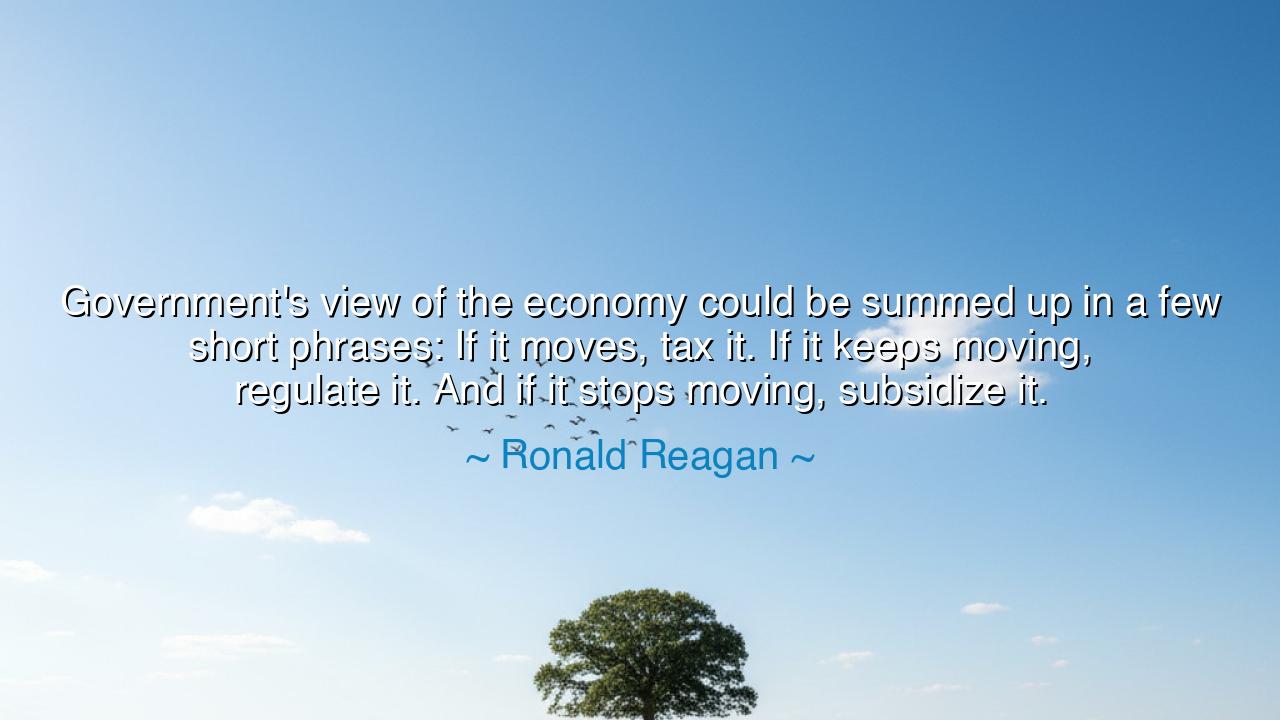
Government's view of the economy could be summed up in a few
Government's view of the economy could be summed up in a few short phrases: If it moves, tax it. If it keeps moving, regulate it. And if it stops moving, subsidize it.






“Government’s view of the economy could be summed up in a few short phrases: If it moves, tax it. If it keeps moving, regulate it. And if it stops moving, subsidize it.” — Ronald Reagan
Hear these words, O seeker of wisdom, for they come not merely from wit but from the deep understanding of a man who had seen both the greatness and the folly of power. When Ronald Reagan, the fortieth President of the United States, spoke these words, he did so with the humor of a storyteller — yet beneath that humor lay a profound warning. He spoke of the eternal tension between government and freedom, between the desire to guide and the danger of control. His words were a lamp held high against the creeping shadows of bureaucracy, that men might see how good intentions can so easily become chains.
To tax is to take from motion. To regulate is to bind what moves too freely. And to subsidize is to sustain what can no longer stand on its own. In these three acts — taxing, regulating, subsidizing — Reagan saw the rhythm of the state’s interference in the natural flow of human enterprise. He knew that the economy is not a machine of gears and levers but a living organism, born of human spirit, ambition, and creativity. When left to breathe, it grows; when smothered by control, it falters. His jest was a parable: the more government meddles, the less the people thrive, until vitality itself must be bought with borrowed coin.
The origin of this truth lies not in Reagan’s time alone but in the long memory of nations. History is filled with rulers who, in the name of order, sought to direct every trade, set every price, command every grain of wheat. The Roman emperors, once mighty, drowned their economy in taxes to feed their wars and their luxuries. When the farmers fled their fields and the merchants closed their stalls, the emperors decreed subsidies to keep the empire alive — and thus Rome, once free and fierce, became a shell fed by the wealth it had already devoured. So it has been in every age: when power grows too heavy, the spirit of creation fades.
Consider also the lesson of the Soviet Union, whose rulers, in their quest to perfect the state, strangled the soul of enterprise. Factories stood where fields had flourished, and quotas replaced imagination. The people’s work was no longer born of pride or purpose but of command and fear. They taxed movement with suspicion, regulated dreams into obedience, and subsidized failure until the entire system collapsed beneath its own weight. In this, the wisdom of Reagan shines with painful clarity — for what is economy without liberty, and what is progress without incentive?
Yet let not these words be taken as scorn for all governance. For law and liberty must walk together, and even the freest markets need justice as their guard. The wise ruler does not abolish the state, but restrains it. He sets rules not to choke movement but to keep it honest. He taxes not to punish success but to preserve the common good. And when he gives aid, he does so not to buy loyalty, but to lift the fallen that they may walk again. Reagan’s laughter, sharp though it was, carried this deeper message: that the purpose of government is not to rule motion, but to protect the freedom that makes motion possible.
The lesson, then, is one of balance and vigilance. Beware the creeping comfort of dependency, whether for yourself or your nation. For every coin the state gives, it must first take from another; and every law that promises safety may steal a little of your strength. Work freely, think boldly, create with joy — and demand of your leaders that they protect, not possess, your labor. Remember always that prosperity grows not from decrees, but from the courage of individuals who dare to build, trade, and dream.
So, O listener of the ages, hold fast to this teaching: freedom is the breath of prosperity, and government, like fire, must be kept within its hearth lest it consume the home it was meant to warm. Let the state serve the people, not master them. Let taxes be few, regulations just, and subsidies rare — for the greatness of a nation is measured not by what its rulers control, but by what its citizens create. In the end, it is not the hand of government that sustains the world, but the will of free men and women who choose to move — unshackled, unafraid, and unbound.






AAdministratorAdministrator
Welcome, honored guests. Please leave a comment, we will respond soon